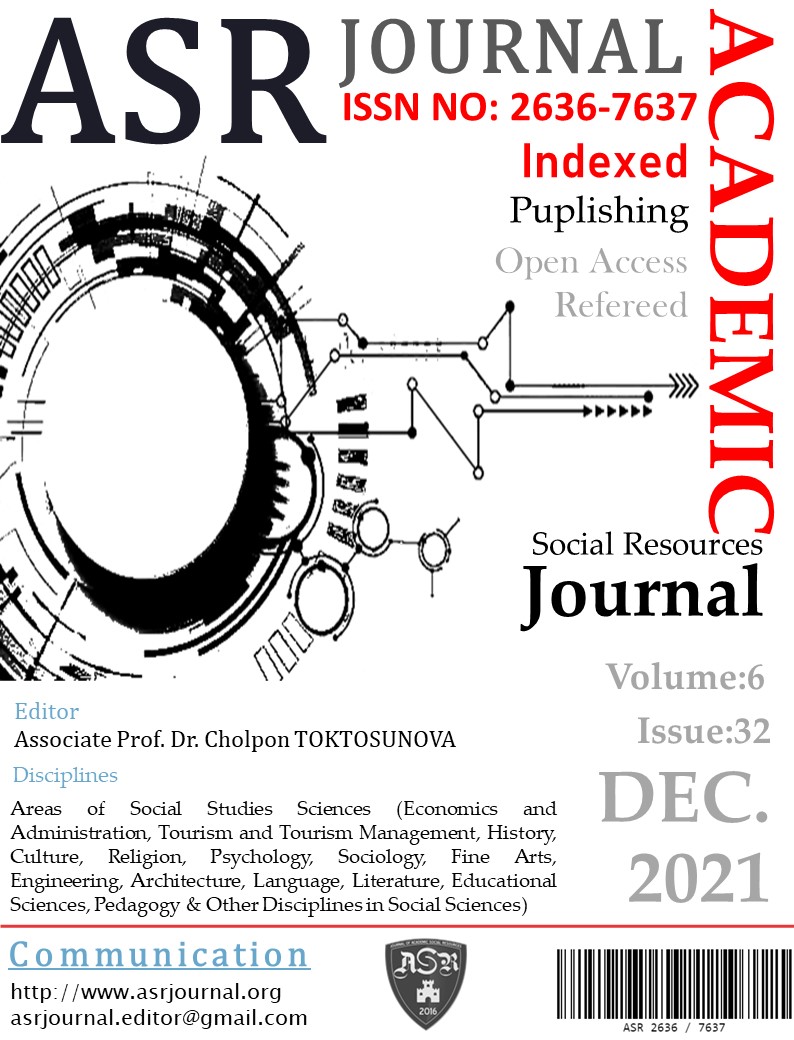TÜRKİYE’DE 1980 SONRASI MESLEKİEĞİTİM POLİTİKALARININ MESLEKİ VE TEKNİK EĞİTİM OKULLARINDA YARATTIĞI DÖNÜŞÜME İLİŞKİN YÖNETİCİ VE ÖĞRETMENLERİN GÖRÜŞLERİ
Author :
Abstract
Teknolojik ve ekonomik değişimler eğitim uygulamalarında değişikliklere neden olmaktadır. Değişimlerin uygulayıcısı yönetici ve öğretmenlerin değer yargılarını öğrenmek önem kazıdığı için, araştırmanın amacını, Türkiye’de 1980 sonrası mesleki eğitim politikalarının mesleki eğitim okullarında yarattığı dönüşüme ilişkin yönetici/öğretmenlerin görüşleri oluşturmuştur. Amaca uygun olarak geliştirilen ölçme aracı Ankara merkezinde dokuz ilçeden seçilen resmi mesleki ve teknik öğretim kurumlarında görev yapan 428 yönetici/öğretmene uygulanmıştır. Araştırmada sorulara verilen yanıtlar yüzde ve frekans değerlerine göre yorumlanmıştır. Araştırmaya katılan yönetici/öğretmenlerin cinsiyet ve bölgesel farklılıklarına göre anlamlı fark olup olmadığı ki kare testiyle sınanmıştır. Araştırmaya katılan öğretmen ve yöneticilerin görüşleri değerlendirildiğinde ulaşılan sonuçlardan bazıları; Mesleki ve teknik liselere gelen öğrencilerin alan/dal seçimi ilgi ve yetenekleriyle uyumlu değildir. Uygulamadaki modüller ve programlar güncel değildir. Mesleki ve teknik eğitime öğretmen yetiştiren fakültelerin kapatılması gelecekte mesleki ve teknik eğitim için alanı bilen öğretmen yetersizliğine neden olacaktır. Yine araştırma sonuçlarına göre; meslek lisesine kayıt olan öğrencilerin, 10 uncu sınıftan itibaren iş kazası risklerine karşı devlet tarafından zorunlu sigorta kapsamına alınması ve devletin işletmelerde mesleki eğitim yapan öğrencilere ödenecek asgari ücretin yüzde 30’unun 1/3 ve 2/3 oranında katkıda bulunması doğru bir karardır. Mesleki ve teknik ortaöğretim okul/kurumlarında uygulamalı eğitim ortamları araç, gereç, donanım yeterli değildir. Mesleki teknik eğitimin finansmanı devletçe karşılanmalıdır.
Keywords
Abstract
Technological and economic changes cause changes in educational practices. Since it is important to learn the value judgments of administrators and teachers who implement the changes, the aim of the research is the opinions of the administrators/teachers regarding the transformation created by the vocational education policies after 1980 in vocational education schools in Turkey. The measurement tool, which was developed in accordance with the purpose, was applied to 428 administrators/teachers working in official vocational and technical education institutions selected from nine districts in the center of Ankara. The answers given to the questions in the research were interpreted according to the percentage and frequency values. The chi-square test was tested whether there was a significant difference according to the gender and regional differences of the administrators/teachers participating in the research. When the opinions of the teachers and administrators participating in the research are evaluated, some of the results are; The field/branch selection of students coming to vocational and technical high schools is not compatible with their interests and abilities. Modules and programs in the application are not up to date. Closing the faculties that train teachers for vocational and technical education will cause a shortage of teachers who know the field for vocational and technical education in the future. Again, according to the results of the research; It is a correct decision that the students enrolled in vocational high schools should be covered by the state's compulsory insurance against the risks of work accidents, starting from the 10th grade, and that the state should contribute 1/3 and 2/3 of the minimum wage to be paid to the students who do vocational training in enterprises. Applied education environments in vocational and technical high schools tools, equipment and equipment are not sufficient. Vocational and technical education should be financed by the state
Keywords
- Adıgüzel,O.C. ve Berk,Ş. (2009). “Mesleki Ve Teknik Ortaöğretimde Yeni Arayışlar ve Yeterliğe Dayalı
- Adıgüzel,O.C. ve Berk,Ş. (2009). “Mesleki Ve Teknik Ortaöğretimde Yeni Arayışlar ve Yeterliğe DayalıModüler Sistemin Değerlendirilmesi” Yüzüncü Yıl Üniversitesi, Eğitim Fakültesi Dergisi. Haziran 2009. V1(I), 220-236 http://efdergi.yyu.edu.tr
- Balcı, A. (1997). Sosyal bilimlerde araştırma: Yöntem, teknik ve ilkeler. (2.Baskı). Ankara: 72TDFO Bilgisayar Yayıncılık San. Tc. Ltd. Şti.
- Büyüköztürk, Ş., Kılıç, E., Akgün, Ö.E., Karadeniz, Ş. ve Demirel, F. (2008). Bilimsel Araştırma Yöntemleri, Ankara: Pegem A Yayıncılık.
- ÇEV-ERG,(2015) Meslek Liselerinde Toplumsal Cinsiyet Eşitliği Ümraniye ve Şişli Mesleki ve Teknik Anadolu Liseleri Örneği, Çelikel Eğitim Vakfı
- Demirtaş, B. ve Küçük, M. (2008). “ Kız Meslek Liselerinin Günümüzdeki Sorunlarına Yönelik Öğretmen Görüşleri.” Ahi Evran Üniversitesi Kırşehir Eğitim Fakültesi Dergisi, 9,(3), 147-159
- Durmuşçelebi,D. ve Deliktaş, M. (2016). “Meslek Liselerinde Yaşanan Sorunlar ve ÖğretmenlerinTükenmişlik Düzeyleriyle İlişkisi- Kayseri İli Örneği” https://www.researchgatenet/publication/309613058_Meslek_liselerinde_yasanan_sorunlar_ve_ogretmenlerin _tukenmislik_duzeyleri_ile_iliskisi_- _Kayseri_ili_ornegi adresinden 25 Ocak 2018 tarihinde alınmıştır.
- ERG (2012b). Mesleki ve teknik eğitimde güncellenmiş durum analiz raporu İstanbul ERG ve Vehbi Koç Vakfı
- ERG (2016). Eğitim İzleme Raporu 2015. İstanbul ERG.ERG (2017). Eğitim İzleme Raporu 2016. İstanbul ERG
- Hürriyet, (2018) . http://www.hurriyet.com.tr/ekonomi/8-bin-ogrenciye-27-milyon-lira-ayirdi-meslek-lisesi- memleket-meselesi-ni-model-e-donusturdu-18191341 adresinden 28.4.2018 tarihinde alınmıştır.
- Kalkınma Bakanlığı. (2014) Onuncu Kalkınma Planı (2014 -2018).http://www.ahika.gov.tr/assets/ilgilidosyalar/Onuncu-Kalkinma-Plani.pdf , adresinden 1 Ocak 2016 tarihinde alınmıştır
- Karasar, N. (1994). Bilimsel Araştırma Yöntemi. Ankara: 3A Araştırma Eğitim Danışmanlık Ltd.
- MEB, (2014). Türkiye Mesleki ve Teknik Eğitim Strateji Belgesi ve Eylem Planı 2014-2018 Ankara: MEB
- Özdemir, Y. (2016). “Kültür” Derslerine Direniş: Bir Endüstri Meslek Lisesinde Kafa/Kol Emeği Ayrımına Dayalı İşbölümünün Yeniden Üretimi” Eğitim Bilim Toplum Dergisi / 14 (53) Kış: 2016 , 68-11
- Özdoğan, E. (2017). “Genel Liselerde Bütçe Yönetimine İlişkin Karşılaştırmalı Bir Çözümleme” Eğitim Bilimleri Araştırmaları Dergisi Uluslararası E-Dergi 7 ,(2) Ekim 2017.
- Tezcan, M. (1972). “Toplumumuzda Mesleki ve Teknik Öğretim İle İlgili Değer Yargıları ve DeğişmeEğilimleri” Ankara Üniversitesi Eğitim Bilimleri Dergisi 5,(1), DOI: 10.1501/Egifak_0000000333 Yayın Tarihi: 1972
- TUİK, (2018) Haber Bülteni http://www.tuik.gov.tr/HbGetirHTML.do?id=27688 adresinden 16 Mayıs 2018 tarihinde alınmıştır.
- Uçar, C. ve Özerbaş, M.A. (2013). "Mesleki ve Teknik Eğitimin Dünyadaki ve Türkiye'deki Konumu", Eğitim ve Öğretim Araştırmaları Dergisi, 2, (.2),:242-253.
- Yaşar, M.R. (2016). “Yoksulluk, Akademik Başarı ve Kültürel Sermaye İlişkisi” Sosyal Bilimler Dergisi 6 (11 ) Haziran 2016, 202-237.





